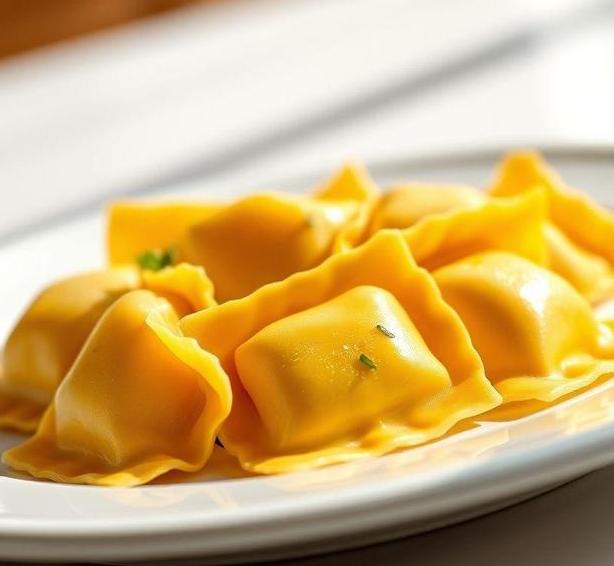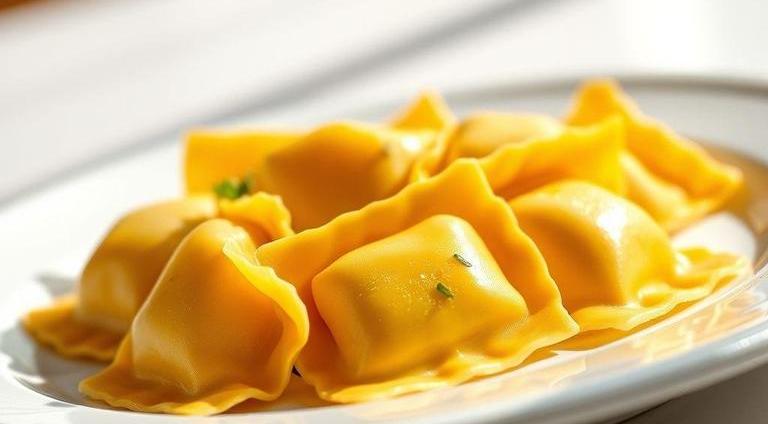Cheese ravioli-a comforting dish that combines soft pasta pockets with rich, gooey cheese filling. Whether you’re making it from scratch or grabbing a frozen pack from the store, it’s a meal that’s hard to resist. But like with any food, especially those that include dairy and other perishable ingredients, you might wonder: Can cheese ravioli go bad? After all, nothing is more disappointing than preparing your favorite meal only to realize it’s spoiled.
In this guide, we’ll dive deep into how to properly store cheese ravioli, how long it stays good, and how to tell if it’s past its prime. You’ll also get expert tips on ensuring your ravioli lasts as long as possible without compromising flavor or safety. Ready to dive into all things cheese ravioli? Let’s go!
Can Cheese Ravioli Go Bad?
Absolutely, yes-cheese ravioli can go bad. Although pasta itself is relatively shelf-stable, the fillings inside ravioli are what make it susceptible to spoilage. With cheese, dairy products, and sometimes fresh ingredients like herbs or vegetables, ravioli becomes more perishable. These fillings can spoil quickly if not stored properly, leading to both a loss of flavor and potential health risks.
- Dairy Danger: The cheese inside ravioli is especially sensitive to bacteria. Cheese is a perishable product, and once the ravioli has been cooked, bacteria can thrive if left in the wrong conditions.
- Storage is Key: The way you store your ravioli directly impacts its shelf life. Room temperature, exposure to air, and even the humidity can all affect whether or not your ravioli goes bad.
- Frozen vs. Fresh: Fresh ravioli is far more susceptible to spoilage, while frozen ravioli, if stored correctly, can last for a long time.
Shelf Life For Cheese Ravioli

The shelf life of cheese ravioli can vary depending on a few factors: whether it’s fresh or frozen, if it’s been cooked or is still raw, and how well it’s been stored.
Fresh Cheese Ravioli (Uncooked)
- Refrigerated: If you have fresh, uncooked cheese ravioli, it will typically last around 2-3 days in the fridge. This is assuming that the ravioli is stored properly in an airtight container or well-wrapped to prevent exposure to air and moisture.
- Frozen: If you freeze your fresh ravioli, it can last for about 1-2 months in the freezer, sometimes even up to 3 months if it’s stored properly. Freezing preserves the freshness and taste, so it’s always a good option if you’re not going to eat it right away.
Cooked Cheese Ravioli
- Refrigerated: Once the ravioli is cooked, it’s best to eat it within 3-4 days. After that, it starts to lose its flavor and texture, and the risk of bacteria growth increases. Always store leftovers in an airtight container to prevent contamination and moisture.
- Frozen: Cooked ravioli can also be frozen for up to 2-3 months. Freezing cooked pasta preserves its texture and taste, though you may notice a slight change in the quality when you reheat it.
Common Signs Of Spoilage
Knowing when cheese ravioli has gone bad is crucial for both your safety and enjoyment. Here are some telltale signs to look out for:
Unpleasant Odor
- Fresh Ravioli: When ravioli starts to spoil, the cheese filling can develop a sour or rancid smell. Dairy products like cheese can sour very quickly, and you’ll easily detect a funky or sour smell.
- Cooked Ravioli: If you’ve reheated your ravioli and it smells off, that’s a clear indicator that it’s no longer safe to eat.
Discoloration
- Cheese Filling: If the cheese inside the ravioli turns an unusual color (grayish, greenish, or brown), that’s a major red flag. This means bacteria might have started to grow.
- Pasta: Though pasta itself is less likely to discolor, if it does, it could be a sign of moisture exposure or mold growth.
Texture Changes
- Slime or Stickiness: When cheese ravioli goes bad, it might develop a slimy or overly sticky texture. This can happen if the pasta absorbs too much moisture or the cheese inside begins to break down.
- Soggy Pasta: Fresh ravioli that turns mushy or soggy is a sign of excessive moisture, likely from being stored improperly.
Mold Growth
- If you notice visible mold on the pasta or filling, it’s a clear sign your ravioli has spoiled. Mold can appear in any color (black, green, white), and it’s best to discard any ravioli that has mold growth.
Taste
- If you’re unsure and the ravioli looks and smells fine, take a small bite. If it tastes sour or off in any way, throw it away. Your taste buds are a great indicator of spoilage, even if other signs haven’t appeared yet.
How To Store Cheese Ravioli?

Proper storage is essential to extending the shelf life of cheese ravioli and keeping it fresh. Whether it’s fresh or cooked, there are specific methods to ensure it stays safe to eat for as long as possible:
Storing Fresh Ravioli (Uncooked)
- Refrigerator: Place the ravioli on a baking sheet or tray lined with parchment paper so that the ravioli doesn’t stick together. Once they’re set, you can transfer them to an airtight container or resealable plastic bag. Ensure that there is minimal air in the container to prevent the ravioli from drying out. Store it in the coldest part of your fridge.
- Freezer: Freezing fresh ravioli is one of the best ways to preserve it. Lay the uncooked ravioli out on a baking sheet in a single layer and freeze them until solid (about 1-2 hours). Then transfer them into an airtight container or freezer bag. This prevents them from sticking together when frozen.
Storing Cooked Ravioli
- Refrigerator: Allow the cooked ravioli to cool to room temperature before storing it. Transfer it into an airtight container or wrap it tightly in foil or plastic wrap. Place it in the fridge as soon as possible to minimize bacterial growth.
- Freezer: If you have leftover cooked ravioli, freezing it is also an option. Lay the cooked ravioli flat on a baking sheet and freeze it individually before transferring to a freezer-safe container or bag. This method helps keep the ravioli from sticking together when reheated.
Expert Tips
- Don’t Overstuff: If you’re making fresh ravioli at home, avoid overstuffing the pasta with cheese or other fillings. This can lead to an uneven seal, which could cause the ravioli to burst open or spoil more quickly.
- Label Everything: If you’re freezing ravioli, make sure to label the container with the date it was made. This helps you keep track of its age and prevents you from accidentally keeping it for too long.
- Thawing: For frozen ravioli, it’s often best to cook it directly from frozen, rather than thawing it beforehand. This helps prevent it from becoming mushy.
- Keep it Airtight: Always store ravioli in airtight containers to keep moisture, bacteria, and unwanted air out. This is especially important for cooked ravioli to prevent sogginess.
FAQs
Can Cheese Ravioli Go Bad After Being Cooked?
Yes, cooked cheese ravioli can go bad. If not properly stored in the refrigerator, it can spoil within 3-5 days. Ensure it’s placed in an airtight container to extend its shelf life.
How Long Can Cheese Ravioli Last In The Refrigerator?
Cheese ravioli can last 3-5 days in the refrigerator when stored correctly in an airtight container. After this period, the quality of the ravioli will deteriorate, and it may begin to spoil.
Can Cheese Ravioli Be Frozen?
Yes, cheese ravioli can be frozen. To preserve its quality, freeze it in a single layer on a baking sheet first, then transfer to an airtight container or freezer bag. Frozen ravioli can last up to 3 months.
What Are The Signs That Cheese Ravioli Has Gone Bad?
Signs that cheese ravioli has gone bad include an off or sour odor, discoloration, a slimy texture, or mold growth. If any of these signs are present, discard the ravioli.
Can You Eat Cheese Ravioli Past Its Expiration Date?
It is not recommended to eat cheese ravioli past its expiration date, as it may be unsafe. Even if it looks and smells fine, the ravioli could contain harmful bacteria after the expiration date.
How Can You Tell If Frozen Cheese Ravioli Has Gone Bad?
Frozen cheese ravioli can go bad if it has been improperly stored or if freezer burn has occurred. Look for signs such as ice crystals on the ravioli or a change in texture and color after cooking. If it has a strange taste or smell after cooking, discard it.
How Should You Store Cooked Cheese Ravioli To Prevent It From Going Bad?
Store cooked cheese ravioli in an airtight container in the refrigerator. Ensure it’s cooled to room temperature before refrigerating, as placing hot food in the fridge can lead to bacteria growth.
Can Cheese Ravioli Be Left Out Overnight?
Cheese ravioli should not be left out at room temperature for more than 2 hours. Bacteria can multiply rapidly at temperatures between 40°F and 140°F (4°C-60°C), which can lead to foodborne illness.
Does The Type Of Cheese Affect How Long Ravioli Lasts?
Yes, the type of cheese in the ravioli can impact its shelf life. Fresh cheeses like ricotta may spoil more quickly compared to aged cheeses. Ravioli with fresh cheese fillings should be consumed sooner, ideally within a few days of preparation.
Can Cheese Ravioli Cause Food Poisoning If It Goes Bad?
Yes, if cheese ravioli goes bad and is consumed, it can cause food poisoning. Symptoms such as nausea, vomiting, diarrhea, and stomach cramps can occur if the ravioli is contaminated with harmful bacteria like Salmonella or E. coli.